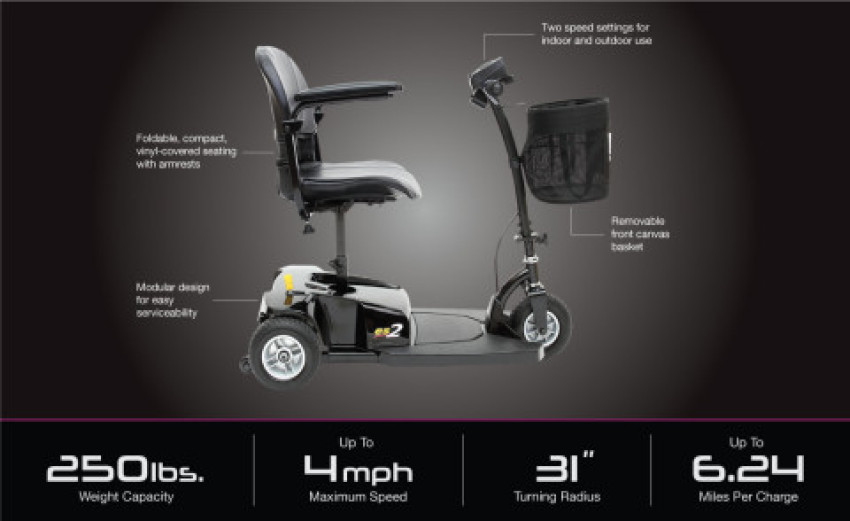
As urban areas become more congested, the demand for sustainable and space-efficient transportation is on the rise. Electric 3-wheel scooters are gaining traction as a practical and eco-friendly solution. With the ability to navigate through traffic with ease and minimal environmental impact, these sleek vehicles are shaping the future of urban commuting.
Constructed with advanced technology and ergonomic design, the new generation of electric 3-wheel scooters provides an efficient, cost-effective, and emission-free way to get around. The integration of electric power ensures a smooth and noiseless ride, making it an attractive option for eco-conscious commuters. Whether you're a trendsetting urbanite or an environmentally conscious commuter, the electric 3-wheel scooter phenomenon is undoubtedly a conversation worth engaging in.
Join us as we delve into the innovative features, benefits, and market trends of electric 3-wheel scooters, and explore how these vehicles are transforming the urban mobility landscape.
The Environmental Impact of Traditional Transportation
Traditional modes of transportation, such as cars and motorcycles, significantly contribute to air and noise pollution in urban areas. The reliance on fossil fuels for these vehicles not only degrades air quality but also contributes to greenhouse gas emissions. As a result, urban centers often grapple with congested roads and deteriorating air quality, impacting the overall well-being of city dwellers. The need for sustainable transportation alternatives has become increasingly urgent, driving the demand for eco-friendly options such as electric 3-wheel scooters.
3-wheel scooters offer a promising solution to mitigate the environmental impact of traditional transportation. By operating on electric power, these scooters produce zero tailpipe emissions, reducing the carbon footprint associated with urban commuting. Additionally, their compact size and maneuverability contribute to easing traffic congestion, further enhancing the overall environmental sustainability of urban mobility.
The transition towards electric 3-wheel scooters represents a pivotal shift in urban transportation, aligning with global efforts to combat climate change and create cleaner, healthier cities for current and future generations.
Introducing 3-Wheel Scooters
Electric 3-wheel scooters, also known as trikes or three-wheelers, are innovative personal mobility vehicles designed for urban commuting. Unlike traditional scooters or motorcycles, 3-wheel scooters feature two front wheels and a single rear wheel, offering enhanced stability and maneuverability. These vehicles are powered by electric motors, eliminating the need for gasoline or diesel fuel, and are equipped with rechargeable batteries for convenient and sustainable operation.
The design of electric 3-wheel scooters prioritizes efficiency, safety, and user comfort. Advanced models incorporate ergonomic seating, integrated storage compartments, and intuitive control systems, catering to the diverse needs of urban commuters. With sleek and modern aesthetics, electric 3-wheel scooters embody a blend of functionality and style, appealing to individuals seeking a practical yet fashionable mode of transportation.
As technological advancements continue to drive innovation in the electric mobility sector, the market for 3-wheel scooters is witnessing a surge in interest and adoption, reflecting the growing appetite for sustainable urban transportation solutions.
Advantages of 3-Wheel Scooters
Electric 3-wheel scooters offer a multitude of advantages that position them as compelling alternatives to traditional modes of urban transportation. One of the primary benefits is their environmental friendliness, stemming from their zero-emission operation and reduced reliance on non-renewable fuels. This eco-friendly characteristic not only contributes to cleaner air and reduced noise pollution but also aligns with sustainability goals at both individual and societal levels.
Furthermore, the compact design of electric 3-wheel scooters enables seamless navigation through crowded urban environments, allowing commuters to bypass traffic congestion and reach their destinations efficiently. This agility and maneuverability make them particularly well-suited for short-distance commuting, providing a practical solution for last-mile transportation needs in densely populated areas.
In addition to their environmental and practical advantages, electric 3-wheel scooters offer economic benefits through reduced fuel and maintenance costs. With fewer moving parts compared to traditional internal combustion engine vehicles, electric scooters require less frequent servicing and upkeep, contributing to long-term cost savings for their owners. The overall cost-effectiveness of electric 3-wheel scooters presents a compelling value proposition for individuals seeking sustainable and budget-friendly transportation options.
The combination of environmental, practical, and economic advantages positions electric 3-wheel scooters as versatile and attractive alternatives for urban commuters seeking a greener and more efficient mode of transportation.
Market Trends and Growth of Electric 3-Wheel Scooters
The market for electric 3-wheel scooters is experiencing rapid growth and diversification, driven by evolving consumer preferences and advancements in electric vehicle technology. As urban populations seek sustainable and convenient transportation solutions, manufacturers and startups are expanding their offerings to cater to the increasing demand for electric mobility options.
This expansion is evident in the variety of electric 3-wheel scooter models available, ranging from compact and lightweight designs for urban commuters to robust and feature-rich options for recreational use. Additionally, the integration of smart connectivity features and app-based functionalities is enhancing the user experience, further differentiating electric 3-wheel scooters in the market.
The growth of electric 3-wheel scooters is not limited to consumer adoption; it also extends to collaborations between urban planning initiatives, public transportation systems, and micro-mobility service providers. Cities and municipalities are exploring partnerships to integrate electric scooters into existing transit networks, promoting sustainable and multimodal transportation solutions for residents and visitors.
The convergence of technological innovation, market diversification, and urban infrastructure integration underscores the promising trajectory of electric 3-wheel scooters, positioning them as pivotal components of future urban mobility ecosystems.
Choosing the Right Electric 3-Wheel Scooter for Your Needs
Selecting the most suitable electric 3-wheel scooter involves considering various factors, including intended usage, range requirements, and personal preferences. With a range of options available in the market, prospective buyers should assess their commuting patterns, lifestyle, and desired features to make an informed decision.
Key considerations when choosing an electric 3-wheel scooter include battery capacity, charging infrastructure, maximum speed, and additional features such as lighting, storage, and connectivity. Understanding the performance specifications and practical attributes of different models enables individuals to align their preferences with the capabilities of the scooter, ensuring a well-suited and satisfying ownership experience.
Moreover, exploring user reviews, expert evaluations, and test rides can provide valuable insights into the performance, comfort, and overall usability of electric 3-wheel scooters. By conducting thorough research and seeking firsthand experiences, prospective buyers can make informed choices that align with their specific transportation needs and lifestyle preferences.
The process of selecting the right electric 3-wheel scooter involves a balance of practical considerations and personal preferences, empowering individuals to embrace sustainable and efficient urban mobility tailored to their unique requirements.
Maintenance and Safety Tips for Electric 3-Wheel Scooters
Ensuring the optimal performance and safety of electric 3-wheel scooters involves regular maintenance and adherence to safety guidelines. Owners should prioritize routine inspections of components such as brakes, tires, and electrical systems to identify and address any potential issues promptly. Additionally, keeping the scooter's battery charged within the recommended voltage range is essential for prolonging its lifespan and preserving performance efficiency.
Safety measures for electric 3-wheel scooters encompass wearing appropriate protective gear, adhering to traffic regulations, and practicing defensive riding techniques. Helmets, reflective apparel, and visibility-enhancing accessories contribute to rider safety, especially during nighttime or adverse weather conditions. Familiarizing oneself with local traffic laws and designated scooter lanes further promotes safe and responsible usage of electric 3-wheel scooters within urban environments.
Incorporating these maintenance and safety practices into the ownership experience fosters a culture of responsible and sustainable urban mobility, emphasizing the importance of proactive care and cautious operation for both the riders and the communities they navigate.
The Future of Electric 3-Wheel Scooters
The future trajectory of electric 3-wheel scooters is poised for further advancement and integration within urban transportation ecosystems. Continued innovation in battery technology, electric drivetrains, and lightweight materials will contribute to enhancing the performance, range, and efficiency of electric scooters, making them even more compelling alternatives to traditional vehicles.
Furthermore, the evolution of smart mobility solutions, including autonomous driving capabilities, connectivity features, and integrated navigation systems, is likely to augment the convenience and user experience of electric 3-wheel scooters. These advancements align with the broader trend of smart cities and sustainable urban development, positioning electric scooters as integral components of interconnected and environmentally conscious transportation networks.
As urban populations continue to prioritize sustainability and efficiency in their mobility choices, electric 3-wheel scooters are expected to play a pivotal role in redefining urban commuting and last-mile transportation, contributing to cleaner air, reduced congestion, and enhanced accessibility for city residents.
Electric 3-Wheel Scooter Regulations and Policies
The integration of electric 3-wheel scooters within urban environments necessitates clear regulations and policies to ensure their safe and harmonious coexistence with pedestrians, cyclists, and other road users. Cities and municipalities are developing frameworks that outline permissible usage areas, speed limits, parking guidelines, and operational requirements for electric scooters to promote responsible and lawful utilization.
Moreover, collaborations between local governments, transportation authorities, and scooter manufacturers are fostering initiatives to educate riders about the importance of complying with regulations and respecting public spaces. Awareness campaigns and community engagement efforts aim to cultivate a culture of responsible scooter usage, emphasizing the shared responsibility of all road users in upholding safety and respect for urban infrastructure.
The establishment of comprehensive regulations and policies for electric 3-wheel scooters reflects the commitment to integrating sustainable mobility solutions into urban landscapes while prioritizing the safety and well-being of all individuals who interact within these environments.
Alternative Modes of Green Transportation
In conjunction with electric 3-wheel scooters, a diverse range of alternative green transportation modes is emerging to address the evolving mobility needs of urban populations. This spectrum includes electric bicycles, micro-mobility sharing systems, electric skateboards, and compact electric vehicles, offering individuals a variety of sustainable options to navigate urban environments efficiently.
These alternative modes of green transportation share common objectives of reducing emissions, alleviating traffic congestion, and promoting active and healthy lifestyles. They cater to different preferences and usage scenarios, providing individuals with the flexibility to choose the most suitable and sustainable mode of transportation based on their specific needs and urban context.
The coexistence of diverse green transportation options reflects the dynamic and adaptive nature of urban mobility, accommodating the varied preferences and priorities of urban residents while collectively contributing to the creation of vibrant, livable, and environmentally conscious cities.
Conclusion:
The rise of electric 3-wheel scooters represents a significant milestone in the evolution of urban mobility, offering a sustainable, efficient, and enjoyable mode of transportation for individuals navigating bustling cityscapes.
As the market for electric 3-wheel scooters continues to expand and diversify, and as regulations and policies evolve to accommodate their integration, these vehicles are poised to play a pivotal role in fostering sustainable and inclusive urban transportation ecosystems. By embracing the possibilities presented by electric scooters and other alternative green transportation modes, individuals and communities can collectively contribute to creating vibrant and resilient cities that prioritize environmental stewardship and the well-being of their inhabitants.
The conversation surrounding electric 3-wheel scooters is not merely about a mode of transportation; it is about shaping the future of urban mobility and embracing a sustainable lifestyle that benefits both individuals and the planet. As we embark on this journey towards greener, more efficient urban transportation, the allure of electric 3-wheel scooters invites us to reimagine our cities as vibrant, interconnected, and environmentally conscious spaces where every commute is a meaningful step towards a brighter and cleaner future.






